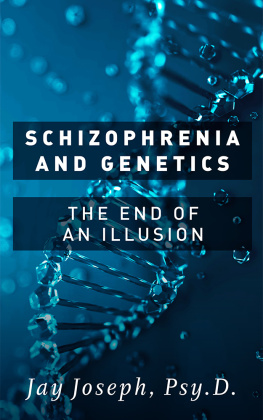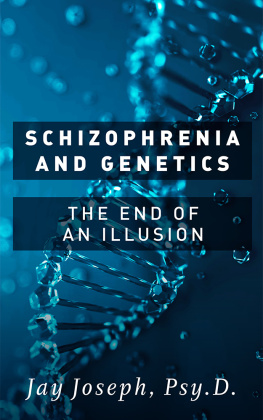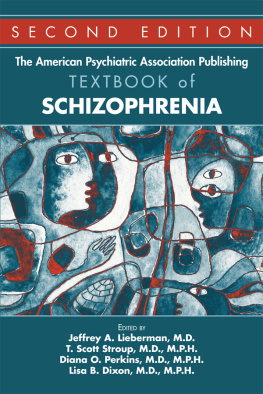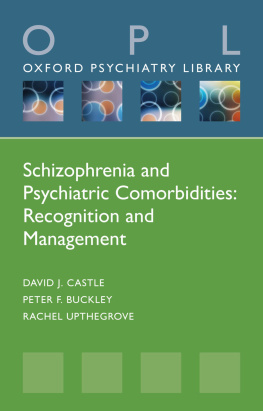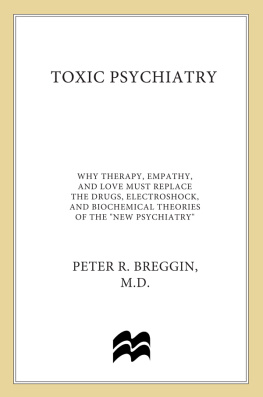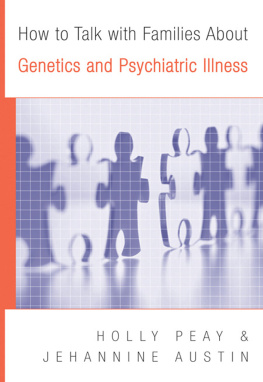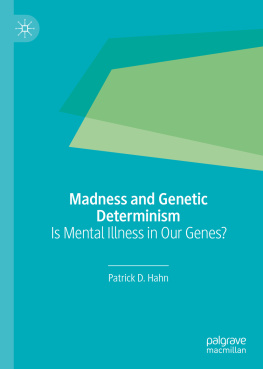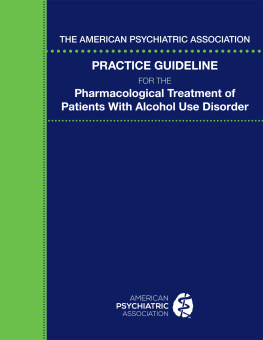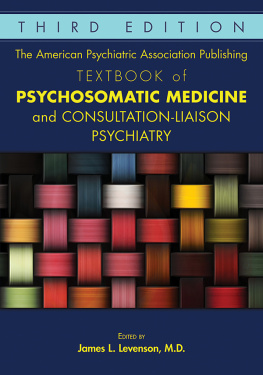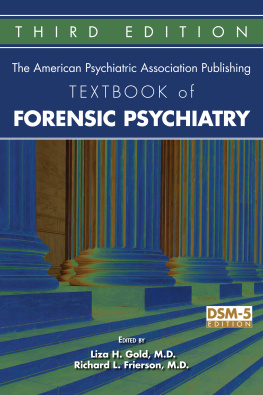
2017 by Jay Joseph, Psy.D., all rights reserved.
ISBN: 9781483598185
For G. G., my best friend and inspiration
Table of Contents
Preface
We are approaching a period of crisis in the social and behavioral sciences, as decades of attempts to discover genes for behavior have, with possible rare exceptions, failed to produce confirmed discoveries. Schizophrenia is the most studied psychiatric disorder, yet in an official 2013 press release the American Psychiatric Association admitted that psychiatry is still waiting for the identification of biological and genetic markers for its disorders. Although some gene discovery claims have appeared since then, psychiatry continues to wait.
I am a clinical psychologist practicing in the San Francisco Bay Area. I have been interested in the genetics of schizophrenia topic since the 1990s, beginning with my 1998 doctoral dissertation A Critical Analysis of the Genetic Theory of Schizophrenia. It was around that time that I became interested in the works of critics of the mental health system and the medical model, such as Peter Breggin, David Cohen, David Cooper, Erving Goffman, David Hill, R. D. Laing, Thomas Szasz, and others. This led me to authors who had critically analyzed genetic research in psychiatry and psychology, which include Mary Boyle, Stephan Jay Gould, Don Jackson, Leon Kamin, Richard Lewontin, Theodore Lidz, Alvin Pam, Ken Richardson, and Steven Rose. My first article on schizophrenia and genetics was published in 1999, and between 2003 and 2015 I published three books critically examining genetic research in the social and behavioral sciences. For 20 years, I have looked closely at the methodological shortcomings and controversial assumptions in twin research, including studies of reared-together and reared-apart twin pairs.
Although according to authoritative mainstream authors and researchers we know that schizophrenia has an important hereditary basis, there is another side to this story that is largely ignored by psychiatry and the media. My desire to help tell this side of the story led me to choose my dissertation topic 20 years ago. C ontinuing the work of the pioneering researchers and commentators mentioned above, and drawing from my previous analyses, here I focus on the massive flaws of schizophrenia genetic research in the context of gene discovery failure.
In Chapter 1, I discuss the schizophrenia concept from several different perspectives, and I review several problems with genetic explanations. Chapter 2 describes the ongoing failure to make confirmed discoveries of genes shown to cause schizophrenia and psychosis, and contains a brief critique of the heritability concept. In Chapter 3, I discuss schizophrenia family studies. I show in Chapter 4 that schizophrenia twin studies are based on a critical theoretical assumption that is clearly false, and therefore provide no evidence in favor of genetics. In Chapter 5, which comprises over half of the book, I examine in detail the major problem areas in the most frequently cited adoption studies. These studies played an important role in turning the tide in favor of genetics, yet serve as an example of how entire scientific fields can overlook massively flawed and biased research performed by leading researchers. In Chapter 6, I join calls for a shift in the study of the causes , treatment , and prevention of schizophrenia and psychosis from currently dominant biological and genetic approaches, to non-medical and environmental approaches. My analysis applies to most other nature-nurture areas of behavior as well, because similar methods are used. The implications, therefore, are enormous.
I have attempted to cove r th e mai n topic s an d controversie s in a way that people outside of the mental health field can understand, and I have therefore kept data reporting to a minimum. For additional information, I have included numerous links to currently available relevant websites, publications, and videos. In contrast to most of what is written in social and behavioral science textbooks, in this e-book I challenge claims made by many of the worlds leading researchers, and show that genetic explanations of schizophrenia rest on false foundations. I am confident that readers will find my analysis refreshingly different from the predicable, sometimes inaccurate, and usually uncritical academic and journalistic accounts of the genetics of schizophrenia topic.
Jay Joseph, Psy.D.
August, 2017
Chapter 1
INTRODUCTION
Data dont tell stories, scientists tell stories.
An academic supervisor, quoted in Chris Chambers 2017 book The Seven Deadly Sins of Psychology
The substantial hereditary component in schizophrenia, a pair of researchers wrote in 1993 on the basis of family, twin, and adoption research, is surely one of the two or three best-established facts in psychiatry.
In this e-book I will attempt to answer Goldmans question in a way that differs greatly from the explanations found in cookie-cutter academic and journalistic accounts of the genetics of schizophrenia topic. Rather than focus on better ways to uncover presumed genes, as these publications often do, I will focus on the methodological flaws and controversial assumptions of previous schizophrenia family, twin, and adoptions studies. Genetic interpretations of this body of research led to attempts to discover predisposing genes (
Before turning to my primary objective, which is a critical reappraisal of schizophrenia family, twin, and adoption research, in this chapter and the next I examine problems with genetic theories of schizophrenia in the context of the ongoing failure to make confirmed discoveries of predisposing genes. These problems include low reproduction rates, the fact that the majority of people diagnosed with schizophrenia have no family history of the condition, the questionable reliability and validity of a schizophrenia diagnosis, and faulty brain disease theories.
Differing Concepts of Schizophrenia
The diagnosis/term Bleuler believed that hallucinations and delusions were secondary symptoms resulting from the primary thought disturbance.
Kraepelin and Bleuler believed that the condition each described was caused by a disease process triggered by an inherited predisposition (Anlage). However, psychiatry critic Thomas Szasz (1920-2012) pointed out in 1976 that instead of focusing on what Kraepelin and Bleuler believed, contemporary commentators should instead focus on these investigators utter inability to support their beliefs with a shred of relevant evidence (italics in original). What Kraepelin and Bleuler helped to accomplish, in Szaszs view, was to subtlyredefine the criterion of disease, from histopathology [pathology of tissues] to psychopathologythat is, from abnormal bodily structure to abnormal personal behavior.
The psychiatric genetics field was founded in Germany in the early part of the 20th century. German
Modern psychiatric geneticists perform family, twin, adoption, and molecular genetic research. They attempt to assess the influence of genetic factors on mental disorders in order to better understand, treat, and prevent them, while promoting the use of genetic counseling programs.
For contemporary psychiatry and its psychiatric genetics subfield, schizophrenia is a severe mental disorder with a lifetime risk of about 1%, characterized by hallucinations, delusions and cognitive deficits, with heritability estimated at up to 80%, or a heritable brain illness with unknown pathogenic mechanisms.

